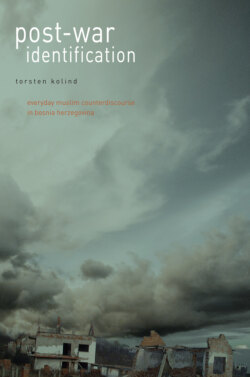Читать книгу Post-War Identification - Torsten Kolind - Страница 29
The destruction of stories
ОглавлениеAnother aspect of the unmaking of the world relates to the destruction or questioning of the values and principles governing normal social life: what van de Port calls “the damage war can cause to stories” (1998: 109). The stories damaged by my informants’ wartime experiences were not epic, but rather the simple tales that make everyday social interaction meaningful, understandable and predictable: You can trust your friends. Children are the most valuable thing in life. Criminals go to jail. In hospitals sick people are cured. War happens somewhere else. The family is a safe haven. Jackson (2002) has argued that the fundamental function of stories and narratives is to enable the individual to integrate his personal world and the wider world of others, in his words “transforming private into public meanings” (ibid. 15). He describes how narratives meet an existential human need for “sustaining a sense of agency in the face of disempowering circumstances” (ibid.). The unmaking or questioning of peoples’ stories thus destroys the very foundation of self-identification and this sense of agency. However, unmaking relates not only to how such stories suddenly break down or slowly crumble away, but also to how one starts questioning the very foundation of (such) stories, that is, starts seeing them as only an illusion.
It is interesting that questions of identity often arise […] in the face of terror (warfare) and cruelty. It is perhaps here that people meet the most significant challenges to their sense of self and humanity. “Violence”, as Allen Feldman has noted, “itself both reflects and accelerates the experience of society as an incomplete project, as something to be made” (Nordstrom 1997: 189).
The following examples from my informants’ discourse will illustrate how their experiences affected the stories they lived by before the war. All of these people experienced the disintegration of stories which had formerly bestowed meaning on their lives. For the first time, they were led to reflect on values and narratives that they had always taken for granted.
